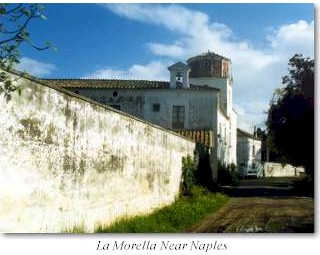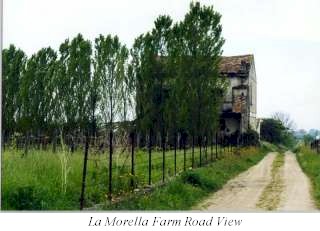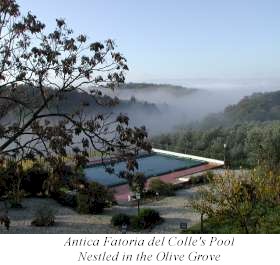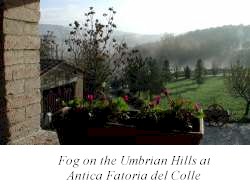 Back a few decades ago, the Italian
government initiated a campaign to make available low-cost loans for owners of
small family-owned farms (an endangered species) to construct B & B style
apartments or rooms within their farms. There
were multiple goals, but primarily it was the preservation of a great national
treasure: the traditional small farms with their old ways of raising and
harvesting foods along with its preparation with regional recipes, coupled with
providing a means for city folks to get away and enjoy the bucolic country life.
Italian citizens have been enjoying agriturismi for some time, but it is
only recently that foreigners – especially Americans – have become exposed
to its many benefits. We have traveled to Italy with the same group on and off for
about seven years and ventured to an agriturismo a few years ago.
Our first was the wonderful La
Morella south of Naples. I’ll
have a web page soon on La Morella, but if you are interested in the Naples area
(and you should be), check out Fabio’s
web site by clicking on the image.
Back a few decades ago, the Italian
government initiated a campaign to make available low-cost loans for owners of
small family-owned farms (an endangered species) to construct B & B style
apartments or rooms within their farms. There
were multiple goals, but primarily it was the preservation of a great national
treasure: the traditional small farms with their old ways of raising and
harvesting foods along with its preparation with regional recipes, coupled with
providing a means for city folks to get away and enjoy the bucolic country life.
Italian citizens have been enjoying agriturismi for some time, but it is
only recently that foreigners – especially Americans – have become exposed
to its many benefits. We have traveled to Italy with the same group on and off for
about seven years and ventured to an agriturismo a few years ago.
Our first was the wonderful La
Morella south of Naples. I’ll
have a web page soon on La Morella, but if you are interested in the Naples area
(and you should be), check out Fabio’s
web site by clicking on the image.
An agriturismo is not for everyone.
 Fist off, it takes a bit of work finding the kind of place that suits
your needs, and even then it is a bit of a gamble.
They vary as much as hotels and there is no star system to guide you.
Some have wonderful accommodations; some have dreadful.
Some have spectacular meals. Some
have none. So Internet research (especially Italian sites: use AltaVista
to translate) and advice from previous guests is the best source in finding
something that works for you. Try
to read between the lines to see if you are getting a hastily done-over room
under the rafters or a genuine farm catering to guests.
Fist off, it takes a bit of work finding the kind of place that suits
your needs, and even then it is a bit of a gamble.
They vary as much as hotels and there is no star system to guide you.
Some have wonderful accommodations; some have dreadful.
Some have spectacular meals. Some
have none. So Internet research (especially Italian sites: use AltaVista
to translate) and advice from previous guests is the best source in finding
something that works for you. Try
to read between the lines to see if you are getting a hastily done-over room
under the rafters or a genuine farm catering to guests.
Most of the better agriturismi are designed
as get-away places for city folk with pools, maybe horseback riding and the like
for relaxation. That is not what
most of us American tourists are interested in.
We can do that without a 20-hour airplane and travel escapade. We are
looking for a place convenient to interesting sights to which we can day-trip, a
chance to experience the “real” Italy, genuine homemade regional food, and a
chance to participate in daily Italian life.
So keep this in mind when deciding if agriturismi is for you.
In any event, a car and a willingness to drive in Italy are mandatory to
consider agriturismi.
The rewards of agruturismi are plentiful.
First off, agriturismi are notoriously inexpensive.
No, often ridiculously cheap.  A
week with wonderful accommodations and two fabulous meals a day can cost well
under a thousand dollars for 2, and as low as $500-$700 – Gads! That’s $100
a day for 2 people with meals. While
price certainly is a consideration for us, we are often more concerned with the
entire experience. We find farms a
far better alternative to hotels because we spend the day combing the hill towns
and other local sights and then come home to relax with a prepared meal and
conversation sharing our experiences. Quite
the opposite, by the way of our preference for staying a city, such as Rome,
Venice or Florence where we will not choose a meza-pensione facility – a
pension with 2-meal provided. There,
we want to explore the restaurants of the city as much as we do the historic
sites.
A
week with wonderful accommodations and two fabulous meals a day can cost well
under a thousand dollars for 2, and as low as $500-$700 – Gads! That’s $100
a day for 2 people with meals. While
price certainly is a consideration for us, we are often more concerned with the
entire experience. We find farms a
far better alternative to hotels because we spend the day combing the hill towns
and other local sights and then come home to relax with a prepared meal and
conversation sharing our experiences. Quite
the opposite, by the way of our preference for staying a city, such as Rome,
Venice or Florence where we will not choose a meza-pensione facility – a
pension with 2-meal provided. There,
we want to explore the restaurants of the city as much as we do the historic
sites.
Here is some of the selection criteria we
use. We want the farm to be a
genuine working farm, preferably family run.
We will only accept places where meals are offered.
(Remember, you can’t walk around the neighborhood looking for a cute
trattoria). We want the food to be
wonderful and prepared as much as possible from the farm.
We want to learn from the owners about the food and the local, so we
prefer if they speak English. We
want them to be gracious hosts - but we don’t want to feel like we moved in
with auntie Bessie for the week. We
also want the accommodations to be comfortable and spacious with modern
bathrooms.
If you are interested in exploring
the possibility of agriturismi, first off, find your target location. Tuscany, Umbria, Campagnia, Piedmonte, etc.
Then start to prioritize the main sights you want to see.
Plot these on a map and then you will have a circle in which you can
easily day-trip. Don’t stretch
this too much - spending half of each day breathing fumes from belching trucks
is not the way to have fun. Then
start searching. There are some
very good sources, Karen
Brown’s Italy: Charming Bed and Breakfasts,
is one, but the Internet is your best source.
Be prepared that many excellent places will
not have email available and may not have their own web site.
You will have to preserver and be patient in communicating.
Remember that these are very busy people with farms to run and the
Italian sense of urgency is not the same as American (one of the reasons you are
vacationing there!). If there is no
email, FAX is the best way to communicate. Most farms only have one phone line
so you need to call and tell them you want to send a FAX and then send the fax.
Also make sure you understand the form of payment acceptable when you
depart. Most farms will not take credit cards and will most certainly
prefer cash.
that many excellent places will
not have email available and may not have their own web site.
You will have to preserver and be patient in communicating.
Remember that these are very busy people with farms to run and the
Italian sense of urgency is not the same as American (one of the reasons you are
vacationing there!). If there is no
email, FAX is the best way to communicate. Most farms only have one phone line
so you need to call and tell them you want to send a FAX and then send the fax.
Also make sure you understand the form of payment acceptable when you
depart. Most farms will not take credit cards and will most certainly
prefer cash.
The real joy of staying on a farm is experiencing
Italy. Not just seeing it. Go on.
Give it a try.
If you are considering the Naples
area, check out La
Morella, with the link above. If you are thinking of Umbria
or southern Tuscany, look into Antica Fatroria del
Colle, pictured here and described elsewhere on my web. To read our
web description of the Antica, click here. To visit
the Antica web site, click here.
We
would certainly recommend both of these.